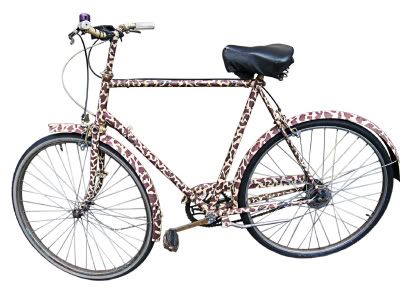
Last time I went in for a check-up, the nurse got angry. She said she'd kill for my blood pressure. She was breathing a little heavy, weighed a lot more than I did and, personally, I didn't take her threat lightly.
"Hey," I said. "It's not like I was born with freaky great genetics. Three of my grandparents died of heart-related problems."
Her eyes narrowed at me and she started flipping back through my chart and said, "Damn it, you also haven't gained any weight in 20 years." Now her face got a little red. "What's your secret?" She asked. "No fats? No carbs?"
"No car," I said. I held up my bike helmet. "No money."
Over the last four decades in the US, the average number of cars per person has steadily risen. On graph paper, try copying the angle of that rise while picturing the increasing number of miles each of us are driving per year, probably with our hands buried in a bag of Doritos. On your graph, sketch in the rise of obesity in this country over those decades. Surprising how neatly the lines mirror each other. Add in data on health expenditures (per person adjusted for inflation). You get the idea. All three lines head up up up.
Now take that graph and compare it to data from the Netherlands, where 25% of all transportation is done by bike. There, obesity and health expenditures per person are one third to one half of the US's.
Or, for a more personal and less scientific survey, step outside your front door. Walk down the street and compare anyone you happen to see driving with anyone biking. In my own unofficial survey, the bigger the car's rear chassis, the bigger the driver's rear chassis. On the other hand, I hardly ever see anyone who's chunky on a bike. Who wants to eat Doritos when you're huffing up a hill?
Being satisfied with the iron-clad nature of my non-peer-reviewed research --and in hopes of being asked on Oprah-- I'm announcing my brand-new diet regime. You don't have to eat only lettuce and cube steak. You don't have to spend several months of rent money on a fancy gym membership. Unlike the Atkins regime, it won't take a few pounds off your gut and then slather even more weight back on once you start eating like a human again.
You just need to follow these three simple steps:
1) Move to the city or close enough to it that you can realistically get around by biking, walking and public transportation (Considering that 75% of Americans are urban dwellers, probably most people can skip this step.)
2) Sell your car (Nice. Incoming money. Not so difficult.)
3) Now that you've done step #2, it's really easy to make sure 25% of all the miles you travel is by bike. From this point on, in order to drive, instead of just opening the door of the car parked in your driveway, you have to walk 10 blocks to the car rental agency and cough up $60. Under these circumstances you'll find exercising has changed from being a superfluous nicety at the bottom of your to-do list to an important necessity. Suddenly you're only driving on those trips that you really need to drive to do. Your willpower has miraculously become ironclad.
And you'll start saving money. According to data taken from the Bureau of Labor Statistics (see BikesatWork's friendly chart if you don't like paging though vast PDF files), the annual costs of owning a car is over $7,300. BicycleUniverse points out that at the average salary of $14 after taxes, that seven grand takes three full months of work to pay for. Three months of every year of your life devoted to paying for your car. If you invested that money every year for 40 years at 8% instead of dropping it into the hands of Ford and MobilExxon, you'd end up with over two million. Of course maybe you live in a more expensive than normal city like Boston or San Francisco. Or maybe you earn more than the average. Either way you can work out your particular savings at BikesatWork.
So sell your car and join the ranks of the rich and healthy. My diet doesn't take any extra time because the time you spend exercising is the time you'd normally be in a car. If you live in a crowded city, you'll find you actually save a lot of time as you whiz by all those traffic jams. Through regular exercise, you'll lower your blood pressure and stop getting irritated by monthly car-insurance bills, rising gas prices and the endless search for parking. You'll stop fueling climate disruption and future Hurricane Katrinas. Start planning what you'll do with that three-month-long vacation.
Try my No-Car Diet for two weeks and make your own decision. Satisfaction guaranteed or your money back (Well, in this case, what you get back are all those expensive car payments and the road rage).
No comments:
Post a Comment